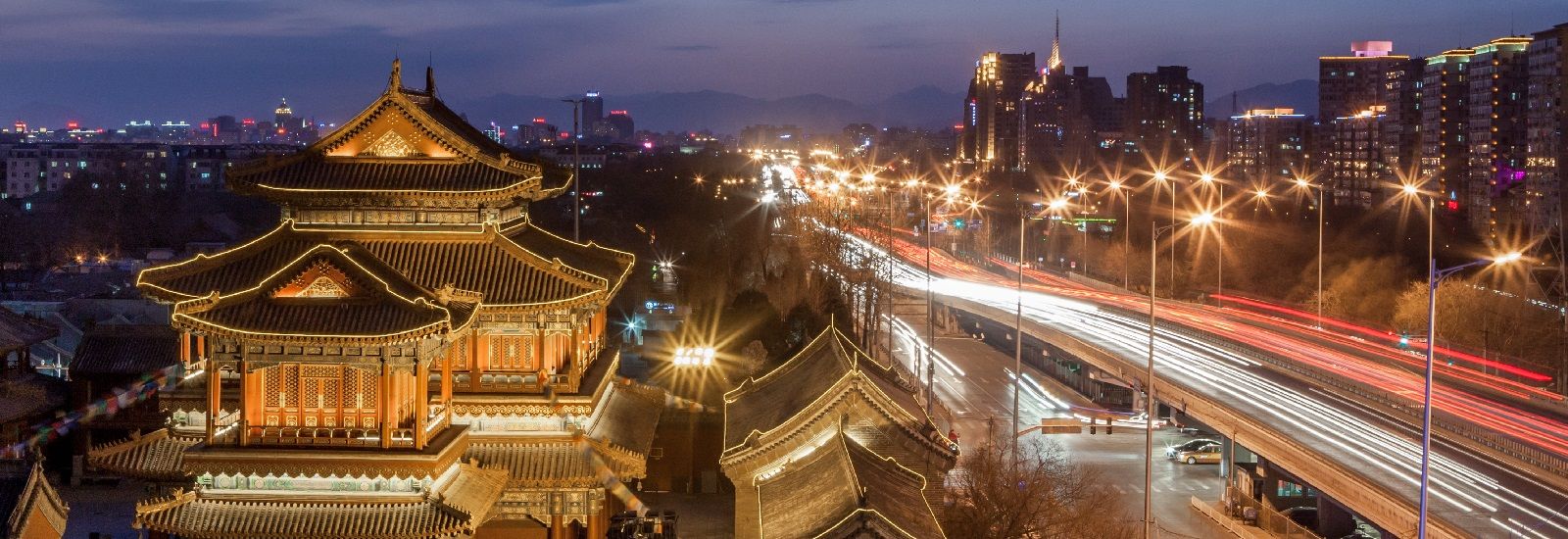
Shining a light on China's history to build understanding of its future
The ongoing trade war between the USA and China is one of the biggest potential threats to the global economy.
With both superpowers imposing billions of pounds' worth of tariffs on each other's goods, it's a bitter conflict – but exemplifies why it's important to build understanding of China, according to Rana Mitter, Professor of the History and Politics of Modern China.
Mary Dalrymple, Professor of Syntax, spoke to Rana about how he has informed understanding of China in, and outside, of the country; and established himself as a source of independent expertise to policy makers.
Mary Dalrymple – Could you tell us about your background?
Rana Mitter - I decided to start learning Chinese about 30 years ago at a time when the presence of China in the UK public sphere was pretty close to zero. There were almost no Chinese students in the UK, no such thing as major Chinese financial investment, and China was still a very poor country. China obviously has turned out to be an immensely important actor but that wasn’t obvious in the late 1980s.
How would you describe your involvement with, or influence on, Chinese policymaking or culture?
As far as I am aware, China is not a country that often solicits direct input into policy from foreign academics. But there are a certain number of westerners whose insights on aspects of China are listened to – sometimes agreed with, sometimes disagreed with, but taken seriously in China.
Most people in that position are recognised as having done significant research and to have taken the time to actually understand China and then make their judgements.
I’m very pleased that my own interpretations of modern Chinese history have been taken seriously in China.
Could you tell us a bit about your research?
Many in the West don't know that the Second World War involved over 10 million deaths in China, 80 million Chinese becoming refugees, and also the holding back of more than half a million Japanese troops. China played a significant role in the Allied war effort but that tends not to be very well known outside China.
I wrote a book about six years ago called China’s War with Japan, 1937-1945: The Struggle for Survival (US title: Forgotten Ally: China's World War II, 1937-1945), about this highly traumatic period. It was essentially a historical work, researched over a decade or so, on China’s experience during the Second World War.
Western books on China often tend to get blocked from publication in China so we were pleased to find that it was permitted for translation.
Translating the book was a generous thing for people in China and Taiwan to have done. I don’t think you can imagine British institutions commissioning a Chinese person to ask what they thought about Dunkirk!
How was the book received in China?
I was surprised, but pleased, to see that the book gained some influence.
It generated a lot of positive press coverage at the time, which was very gratifying. It also won a couple of citations, including from the Xinhua News Agency which nominated it as one of the 10 most useful foreign books published in China that year.
The sub-title of the book in the Chinese translation is 'A Westerner Looks at China’s War of Resistance Against Japan'. That suggested that the book was forming part of a public debate beyond the world of the academic research from which it emerged.
In a sense, the fact that a foreigner wrote the book made it more likely to be considered impartial. It could not be accused of being a propaganda exercise, or of having a biased position from within Chinese society. And this response was all happening around 2014-15, the 70th anniversary of the end of the war.
Can you tell us more about your political engagement in China?
I’ve certainly found myself being asked my opinion on a whole variety of public policy issues by Chinese media and by the Chinese diplomatic community. Generally, I have been very happy to give my own frank assessments.
So, for example, 2015 was an important year, because it marked the 70th anniversary of the end of the war. The Chinese Embassy asked me to come and give a talk, and I've been asked to write several pieces about it. I have also taken part in many symposiums or forums at the Chinese Academy of Social Sciences. This activity is usually in service of trying to discuss why that history matters now.
In addition, after publication of the first book, I discovered that the President of the Republic of China on Taiwan, Ma Ying-jeou, had been speaking about, and praising it at Stanford University.
That led to my being invited, with various other Westerners, to a major conference in Taipei in the summer of 2015, in which a small group of us had a discussion over dinner with Ma Ying-Jeou on topics related to this particular book.
So, in that context it turned out that the book made a useful and somewhat significant contribution to a debate that was going on in China at the time, about the meaning and the legacy of the Second World War in China, and across the Taiwan strait.
Can you tell us more about your involvement with UK policy relating to China?
I can think of a few examples.
The first is my involvement in something called the UK-China Humanities Alliance, which is supported by the British Council after an initiative supported by both governments. It provides a platform for building – and sometimes celebrating – collaboration in a wide range of spheres, including the importance of the humanities in building links between Chinese and UK academics.
Then there's the Great Britain-China Centre; an arms-length organisation established by the Foreign and Commonwealth Office (FCO) since 1974, which helps lawyers and businesses get up to speed on understanding China. I, and other colleagues, have had invitations to do addresses before groups of UK civil servants, to essentially give them a starting point of knowledge about China, which they can build upon.
I’ve also spoken at various events organised by the FCO. And we use the China Centre here in Oxford to host them, and other government actors with interests in China.
Beyond that, China Centre colleagues attend a variety of conferences aimed at developing a stronger sense across Europe of what policy towards China ought to be on defined areas such as trade, security, and economics.
How do you see China's role in the world now – especially in light of the trade war with the USA?
Over the last few years, it has been heartening to see in the UK an uptick of interest in trying to become ‘China ready’ in the public policy sphere. Brexit’s focused minds, but interest has been growing for the last five or six years.
Regardless of what you might think about China, it's a major rising state, its market is very large and there are opportunities in a range of areas the UK specifically does well – from high tech, to pharmaceuticals, to financial services. Higher education is a big one: the UK hosts tens of thousands of Chinese students every year. It’s a major foreign currency earner for the country but it’s also provided an opportunity for the UK to showcase one of its most impressive sectors.
Being able to work effectively with China without having a more in-depth knowledge of how it works is going to be harder and harder to sustain.
The days when foreigners got a helping hand when looking to work in China are over. Of course, China wants foreign investment but it's a much more competitive world where China is asking 'what are you going to do for us?'
Being able to work effectively with China without having a more in-depth knowledge of how it works is going to be harder and harder to sustain.
How well placed is the UK to capitalise on those opportunities?
It’s fair to say there has been, for a while, a bit of a gap in China expertise within the political sphere of the British governmental system.
Some governmental and NGO expertise on China in the UK is outstandingly good. By which I mean in the Foreign Office, the Great Britain-China Centre, and certain specialists within the governmental sector.
And at a high level, the knowledge is also excellent. I am talking about ambassadors, diplomats, people working in various sectors such as education and trade.
The problem is that it's not the same in the broader political sphere, which would include Members of Parliament and the wider political class.
There are some exceptions, such as Liam Byrne, the Labour former shadow cabinet minister, who has spent the last 10-15 years getting to know China very well. But he’s a relatively rare figure in that sense. Former foreign secretary Jeremy Hunt was also very interested in building the UK’s relationship with China.
In the near future, we might need a wider group of people to understand China and its growing influence, and engage more regularly on the parliamentary side. That's not to say that they have to agree with China, or take any particular viewpoint – they just need to be informed.
For example, after the election, there will be much more discussion of a trade deal on China, so we should be thinking about how we get to that point and what we want – and don’t want – from such a deal.
What about China's role on the global stage at the moment?
The trade war with the USA has short and long term implications.
In the longer term, the idea of a trade war is immensely destructive, because essentially it’s about barriers being thrown up in the two single biggest individual markets in the world - China and the United States.
In the short term, there may be areas where there are opportunities for the UK. For example, if China is deterred from investing in higher education in the US, or the US makes it harder for students or researchers from China, this may point to opportunities for others, including the UK.
In the longer term, the idea of a trade war is immensely destructive, because essentially it’s about barriers being thrown up in the two single biggest individual markets in the world - China and the United States.
And I think it’s particularly destructive for the UK, which is proposing to launch itself as a solo, pro-free-trade actor - at a time when we've not seen as many barriers, protectionist measures and tariffs going up for half a century.
And I think it’s particularly destructive for the UK, which is proposing to launch itself as a solo, pro-free-trade actor - at a time when we've not seen as many barriers, protectionist measures and tariffs going up for half a century.
What needs to happen next?
We need to develop a dialogue of what I call 'frank friends' with China. In other words, find a way that people can have a conversation, very much oriented towards the positive but in which both sides are speaking honestly with each other.
What tends to happen far too often is both countries either criticise each other for various aspects of each other's policies; or they put forward high-level, bland and rather empty statements of long-term friendship, without actually making any substantial comment about what that means.
So, what advice might you give to early-career researchers?
The lesson I take from my experience, is that it's important for academics to be doing the work they feel most suited to and try to draw implications from that. Try not to be distracted into doing something that may superficially seem useful, but actually may not be as deep or as rigorous as you would want it to be.

